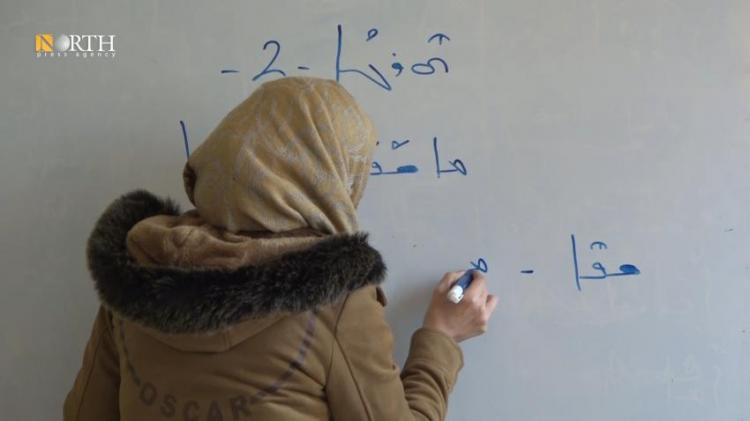Private institutions expand the scope of teaching the Syriac language in north-eastern Syria
Qamishli- North-Press Agency
Reem Chamoun
During the last nine years, the Syriac parties and organizations have worked to spread the Syriac language more widely and outside the church. Since the Syriac language is one of the Semitic languages which Christians in Syria have been learning through churches or through private schools, which only belongs to the Syriac component.
The Syriac language has emerged as an official language alongside the Kurdish and Arabic languages in the Autonomous Administration-held areas, and a private Syriac university was opened in Damascus (Antioch Syrian University) to teach Syriac as a basic university subject.
Galinos Issa, the co-chair of the 'Ulf Tau' Foundation, told North-Press that the foundation was established at early 2016, and is concerned with reviving the Syriac language in the regions of north-eastern Syria. Issa explained that this is done through "preparing an educational cadre to teach the correct Syriac, in addition to preparing, writing, designing, printing and translating books, preparing a curriculum for students in primary, middle and secondary schools, and teaching appropriate education methods in a modern and correct manner," he said.
"Teaching the Syriac language is not exclusive to Syriac students, as it was within the Autonomous Administration plan, teaching the three primary languages (Syriac, Kurdish, and Arabic) to all elementary students, so that they can coexist and learn about the languages, cultures, customs and traditions of other components, which enable them in the future to interact more with one another, and understand and respect other religions,” Issa added.
As for preparing an educational staff of other components, Issa explained that they needed to give them a grounding in this language, as the Syriac language is not exclusive to one component, because it was the historical language and the original language of this region, indicating that there were Syriac universities including Nisibis University , and Orhi University (present-day Urfa).
While teacher Hana Ar'our said: "Since I am from the Arab component, I have submitted for an exam for teaching Arabic, and excelled in it, but I did not get a job because there were no vacancies in schools."
"Although I am displaced from Aleppo, and unidentified to other languages, I have never hesitated to try to learn the Syriac language, knowing that I did not know anything about it," she added.
Ar'our continued saying that when she started to learn the Syriac language, she didn't face much difficulties, as it is a Semitic language close to the Arabic language, and the Arabic language is derived from the Syriac language. Speaking to North-Press, Hana Ar'our added: “I enjoyed and loved learning the Syriac language, because it is the language of Christ, and I was able to somehow excel in it, and I submitted to several exams, I managed to pass them with high marks, and I was appointed as a Syriac language teacher in April of 2018.”
After 6 months of training, Ar'our was appointed as a teacher of mathematics, in Syriac, at Orhi Institute of Olf Tau Foundation in the city of Qamishli.
While Shukriya Muhammad, who is one of the participants in learning the Syriac language, said: "Ever since I was a child, I liked mixing with the Christian component, and being a Kurdish component, I liked to learn other languages. When Ulf Tau Foundation opened, I had the opportunity to learn the Syriac language."
Shukria started her learning of the Syriac language in the third month of the year 2017, and she was appointed after seven months to give courses in the Syriac language for students at Orhi Institute.
It is noteworthy that the Syriac language is one of the main languages in the areas of the Autonomous Administration of northeastern Syria, while it was previously taught, before the Syrian crisis, in private schools mostly belonging to the private sector or to churches in different areas of Syria.

